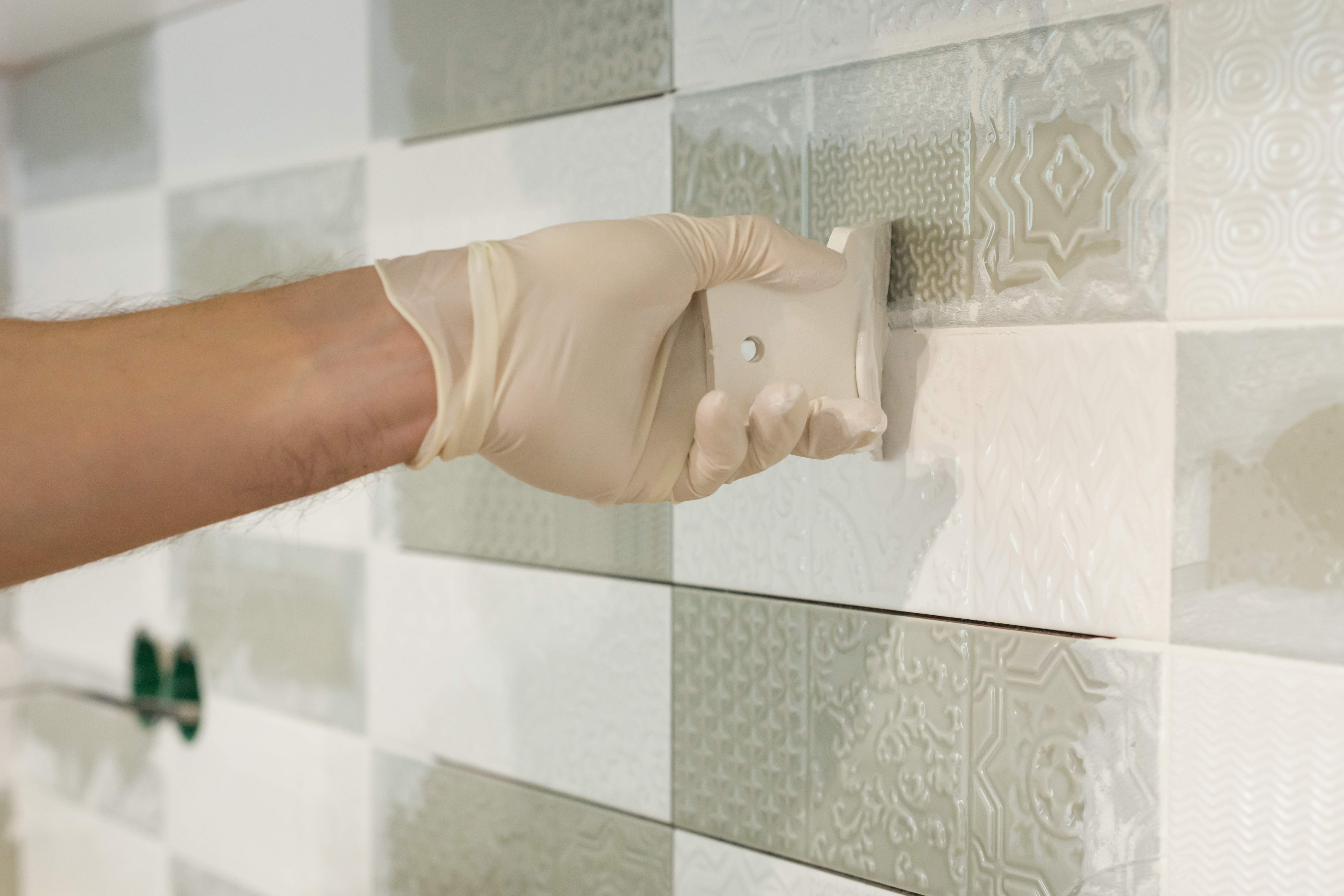Discovering the Best Grout for Your Backsplash
Posted by Mike Belk on Dec 05, 2023

Enhancing Your Backsplash
When it comes to creating a stunning backsplash, choosing the right grout is just as important as selecting the tiles themselves. The grout not only holds the tiles together but also plays a significant role in enhancing the overall aesthetic appeal. In this section, we will explore the importance of choosing the right grout and delve into different grout options available.
The Importance of Choosing the Right Grout
Selecting the appropriate grout for your backsplash is crucial for achieving the desired look and ensuring durability. The right grout not only complements the tiles but also provides structural support and prevents moisture penetration. It helps to maintain the integrity of the installation and ensures that your backsplash stands the test of time.
Additionally, grout color can significantly impact the overall appearance of your backsplash. By choosing a grout color that contrasts or blends harmoniously with the tiles, you can create different effects and highlight the beauty of your chosen design.
Exploring Different Grout Options
When it comes to grout options for your backsplash, there are several types to consider. The most common options include cement-based grout, epoxy grout, and urethane grout. Each of these options has its own unique characteristics, advantages, and considerations.
| Grout Type | Description |
| Cement-Based Grout | Made from a mixture of cement, sand, and water, cement-based grout is widely used for backsplashes. It is affordable, easy to work with, and comes in various colors. However, it may require sealing and can be prone to staining. |
| Epoxy Grout | Epoxy grout is a durable and stain-resistant option that is highly resistant to moisture, chemicals, and color fading. It is ideal for areas prone to high moisture or heavy use. However, it can be more challenging to apply and requires precise mixing and application. |
| Urethane Grout | Urethane grout offers similar advantages to epoxy grout, such as resistance to moisture and stains. It is also flexible and less likely to crack. Urethane grout is available in a wide range of colors and does not require sealing. However, it can be more expensive than other grout options. |
By understanding the importance of choosing the right grout and exploring different grout options, you can make an informed decision that best suits your backsplash project. Keep in mind factors such as tile material, desired aesthetic, and maintenance requirements when selecting the grout. For tips on successfully grouting your backsplash, refer to our article on how to choose grout for backsplash. With the right grout choice, your backsplash will truly shine and enhance the beauty of your space.
Cement-Based Grout
When it comes to choosing the right grout for your backsplash, cement-based grout is a popular option due to its versatility and durability. Cement-based grout is made from a mixture of cement, water, and additives. It is commonly used for various tile installations, including backsplashes. Let's explore how cement-based grout works and the pros and cons of using it.
How Cement-Based Grout Works
Cement-based grout is a powdered mixture that needs to be mixed with water before application. Once mixed, the grout is spread over the tile surface and fills in the gaps between the tiles. As the grout dries, it hardens and provides stability and support to the tiles.
Cement-based grout works by curing through a chemical reaction called hydration. During hydration, the water in the mixture reacts with the cement, forming a solid and durable material. This curing process ensures that the grout becomes strong and resistant to water and stains.
Pros and Cons of Cement-Based Grout
Like any other product, cement-based grout has its advantages and disadvantages. Here are some pros and cons to consider when deciding if cement-based grout is the right choice for your backsplash:
| Pros | Cons |
| Versatility: Cement-based grout is suitable for various tile types and sizes. | Porosity: Cement-based grout can be porous, making it prone to staining and absorbing moisture if not properly sealed. |
| Durability: Once properly cured, cement-based grout provides a strong and long-lasting bond between tiles. | Maintenance: Cement-based grout may require occasional resealing to maintain its appearance and prevent staining. |
| Cost-effective: Cement-based grout is generally more affordable compared to other grout options. | Application: Cement-based grout can be more challenging to apply due to its thicker consistency and shorter working time. |
| Availability: Cement-based grout is widely available in various colors, allowing you to choose the one that best complements your backsplash. | Efflorescence: In some cases, cement-based grout can develop efflorescence, a white powdery residue that forms on the surface over time. |
When using cement-based grout, it's important to follow the manufacturer's instructions for mixing and application. Properly cleaning and sealing the grout after installation can help enhance its longevity and prevent the absorption of moisture or stains. For more information on grout maintenance and sealing, check out our article on grout sealer for backsplash.
Considering the tile material and size, desired aesthetic, and maintenance requirements will help guide your decision when choosing the right grout for your backsplash. Take the time to explore other grout options like epoxy grout and urethane grout to make an informed choice. To learn more about different grout options, refer to our articles on epoxy grout for backsplash and urethane grout for backsplash.
In the next sections, we will delve into epoxy grout and urethane grout to provide you with a comprehensive understanding of the available grout options for your backsplash.
Epoxy Grout
When it comes to choosing the best grout for your backsplash, epoxy grout is a popular option to consider. Epoxy grout is a type of grout that is made from a combination of epoxy resins and a filler powder. It offers several advantages over other grout options, making it a preferred choice for many homeowners.
How Epoxy Grout Works
Epoxy grout consists of two parts - a resin and a hardener. When these two components are mixed together, a chemical reaction occurs, resulting in a strong and durable grout that is resistant to stains, cracking, and water damage.
Unlike cement-based grout, epoxy grout does not require sealing. Its non-porous nature makes it resistant to water absorption, preventing the growth of mold and mildew. This makes epoxy grout an excellent choice for areas prone to moisture, such as kitchen backsplashes and bathroom walls.
Additionally, the chemical composition of epoxy grout gives it superior strength and flexibility. It is highly resistant to chemicals, making it suitable for use in areas where harsh cleaning agents are used. Epoxy grout is also highly resistant to stains, making it easier to maintain and keep your backsplash looking pristine.
Pros and Cons of Epoxy Grout
Here are some key advantages and disadvantages of using epoxy grout for your backsplash:
| Pros | Cons |
| Resistant to stains and water damage | More expensive than other grout options |
| Does not require sealing | Requires precise mixing and application |
| Highly durable and long-lasting | Can be more challenging to work with |
| Resistant to mold and mildew growth | Requires special cleaning agents for removal of excess grout |
When considering epoxy grout for your backsplash, it's important to keep in mind the specific needs of your project and budget. While epoxy grout offers many benefits, it may not be suitable for every situation. Consider consulting a professional or experienced installer to determine if epoxy grout is the right choice for your backsplash project.
For more information on choosing the right grout for your backsplash, check out our article on how to choose grout for backsplash.
Urethane Grout
When it comes to choosing the best grout for your backsplash, urethane grout is a popular option worth considering. Urethane grout is a type of synthetic grout that offers a range of advantages for both homeowners and professionals.

How Urethane Grout Works
Urethane grout is a premixed product that consists of a combination of resin, filler, and colorant. Unlike cement-based grout, which requires water for activation, urethane grout comes ready to use right out of the container. This makes the installation process quicker and more convenient.
One of the key features of urethane grout is its flexibility. It is designed to expand and contract with temperature changes and movement, making it highly resistant to cracking and shrinking. This flexibility is especially beneficial in areas prone to temperature fluctuations, such as kitchens or bathrooms.
Urethane grout is also known for its stain resistance. The non-porous nature of the material prevents stains from penetrating the grout, making it easier to clean and maintain the appearance of your backsplash. Additionally, urethane grout is resistant to mold and mildew growth, which is particularly advantageous in wet environments.
Pros and Cons of Urethane Grout
Before making a decision, it's important to consider the pros and cons of urethane grout:
| Pros | Cons |
| Stain resistant | Higher cost compared to cement-based grout |
| Flexible and crack-resistant | Requires careful application and cleanup |
| Resistance to mold and mildew | Limited color options compared to cement-based grout |
| Easy to clean and maintain | Longer curing time than cement-based grout |
Urethane grout offers several benefits that make it an attractive choice for backsplash installations. Its stain resistance, flexibility, and resistance to mold and mildew make it a low-maintenance option for homeowners. However, it is important to note that urethane grout can be more expensive compared to traditional cement-based grout, and it requires careful application and cleanup to ensure a successful installation.
When considering urethane grout for your backsplash, take into account factors such as the specific needs of your project, your budget, and the desired aesthetic.
Remember, selecting the right grout is crucial for both the functionality and visual appeal of your backsplash. Take the time to explore different grout options, consider the specific requirements of your project, and make an informed decision that aligns with your needs and preferences.
Considerations for Choosing Grout
When it comes to selecting the best grout for your backsplash, there are several important factors to consider. The right grout choice can enhance the overall look and longevity of your backsplash. Here are some key considerations to keep in mind:
Tile Material and Size
The material and size of your tiles play a significant role in determining the type of grout that will work best. Porcelain, ceramic, glass, and natural stone tiles each have different characteristics that can impact the choice of grout. For example, natural stone tiles may require a specialized grout to prevent staining or damage. Larger tiles may benefit from a grout with increased flexibility to accommodate any slight movement.
| Tile Material | Recommended Grout |
| Porcelain | Unsanded or epoxy grout |
| Ceramic | Sanded or unsanded grout |
| Glass | Epoxy grout |
| Natural Stone | Specialized grout for stone |
Desired Aesthetic
The aesthetic you want to achieve with your backsplash is another essential consideration. Grout color can significantly impact the overall appearance. You can choose a grout color that matches the tile for a seamless look, or opt for a contrasting color to make the individual tiles stand out. Keep in mind that lighter grout colors may require more frequent cleaning to maintain their appearance.
For more information on grout color selection for glass tile backsplashes, visit this article on grout color for glass tile backsplash.
Maintenance and Durability Factors
The level of maintenance and durability you desire for your backsplash should also influence your grout selection. Sanded grout, which contains sand particles, is a popular choice for its durability and resistance to cracking. It is suitable for wider grout joints and high-traffic areas.
Unsanded grout, on the other hand, is smoother and is recommended for smaller grout joints and delicate tiles to avoid scratching the surface. Epoxy grout provides maximum durability and stain resistance, making it an excellent choice for areas prone to moisture or heavy use.
To learn more about the specific maintenance requirements and sealing considerations for different grouts, refer to our article on grout sealer for backsplash.
By considering the tile material, desired aesthetic, and maintenance requirements, you can make an informed decision when choosing the best grout for your backsplash. Remember to follow the manufacturer's instructions for proper installation and consult with a professional if you have any doubts.
Tips for Successful Grouting
To ensure a flawless and long-lasting finish for your backsplash, proper grouting techniques are essential. Here are some tips to help you achieve successful grouting results.
Preparing the Surface
Before you begin the grouting process, it's crucial to prepare the surface properly. Follow these steps to ensure a clean and smooth workspace:
- Clean the tiles: Remove any excess adhesive or debris from the tile surface using a damp sponge or cloth. This will help the grout adhere better and prevent any unwanted particles from getting trapped.
- Use masking tape: Apply masking tape along the edges of the tiles to create clean grout lines. This will protect the surrounding areas from any accidental grout smears.
- Pre-wet the tiles: Lightly dampen the tiles with water before applying the grout. This prevents the tiles from absorbing the moisture from the grout too quickly, which can weaken the grout's strength.
Mixing and Applying Grout
Proper mixing and application of grout are crucial for achieving a uniform and durable finish. Follow these guidelines for optimal results:
- Read the instructions: Follow the manufacturer's instructions for mixing the grout. The ratio of water to grout powder may vary depending on the brand and type of grout you are using.
- Mix in small batches: It's best to mix the grout in small batches to ensure a consistent texture and prevent it from drying out before application.
- Apply the grout: Use a grout float or a rubber grout trowel to apply the grout onto the tiles. Hold the float at a 45-degree angle and spread the grout diagonally across the tiles, ensuring it fills the gaps completely.
- Work in sections: Grout one section at a time to prevent the grout from drying out too quickly. This will allow you enough time to clean the excess grout before it hardens.
- Remove excess grout: After applying the grout, use a grout float or a grout sponge to remove the excess grout from the tile surface. Hold the float at a 90-degree angle and swipe it diagonally across the tiles to remove the excess grout.
Proper Cleaning and Sealing
To achieve a polished and finished look, proper cleaning and sealing of the grout are necessary. Follow these steps for an effective cleaning and sealing process:
- Initial cleaning: Wait for the grout to dry completely, usually for 24 to 48 hours, before cleaning. Use a damp sponge or a grout haze remover to clean any residue or haze from the surface of the tiles.
- Final cleaning: Once the grout is fully cured, typically after 7 to 10 days, give the entire backsplash a final cleaning. Use a pH-neutral cleaner and a soft sponge to remove any remaining grout haze or dirt.
- Sealing the grout: Apply a grout sealer to protect the grout from stains and moisture. Follow the manufacturer's instructions for application and reapplication intervals, as different sealers may have varying recommendations.
By following these tips for successful grouting, you can ensure a professional-looking backsplash that not only enhances the beauty of your space but also withstands the test of time.



